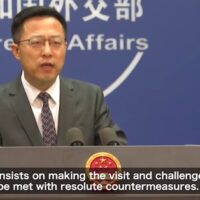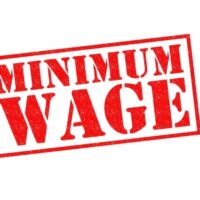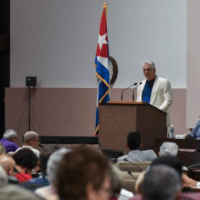-
China is issuing the same “Red Line” warnings about Taiwan that Russia issued about Ukraine
House Speaker Nancy Pelosi has continued to pour gasoline on the foreign policy dumpster fire that is her planned visit to Taiwan next month, now reportedly encouraging other members of congress to come along for the ride.
-
Provoking Beijing
In 1991 Pelosi and two congressmen unfolded a banner on Tianamen in front of the international media that said: “To those who died for democracy in China.” Police immediately intervened and ended the stunt.
-
Russia-Ukraine conflict: the propaganda war
What the mainstream media fail to see in the coverage of the current Ukraine crisis is that there is no text (narrative) without context. Long before the mainstream U.S. (and UK) media launched a worldwide propaganda war against the Russian invasion of Ukraine in February, the CIA had laid the foundations of the conflict in the early years following the Second World War–the Cold War.
-
‘An attack on solidarity’
Trade unions furious with Sir Keir for sacking shadow transport secretary as McDonnell backs growing calls for a general strike.
-
Argentina’s Evita: an indispensable legacy
It is seventy years since the death of Evita, an extraordinary character in Argentine and Latin American history. Owner of a penetrating and mobilizing oratory, she was a proudly plebeian popular leader whose class instinct defined the most advanced and contesting features of Peronism.
-
All that I ask is that you fight for peace today: The Thirtieth Newsletter (2022)
Gas shipments through the Nord Stream 1 pipeline, which runs from Russia to Germany, were reduced to 40% of capacity in June, a cut that Moscow said was due to delays in the servicing of a turbine by the German firm Siemens.
-
Sanctions had no effect on Moscow yet Europe lost 4 governments: Orban
The Western strategy to weaken Russia backfires on Europe.
-
The value of the federal minimum wage is at its lowest point in 66 years
The value of the federal minimum wage has reached its lowest point in 66 years, according to an EPI analysis of recently released Consumer Price Index (CPI) data.
-
Rebuilding collective intelligence
Human capital theory cannot solve our economic woes. David Ridley says we need a socialist alternative.
-
Despite domestic priorities, RBI will have to follow the U.S. Fed
India will have to respond by increasing interest rates further sooner rather than later. Higher U.S. interest rates make global capital abandon other countries and rush to American bonds whose market yields have doubled at the shorter end.
-
U.S. political prisoner Mutulu Shakur has six months to live. Will courts finally grant compassionate release?
Renowned revolutionary leader and health worker Mutulu Shakur has spent over three decades in prison. As his cancer worsens, activists are demanding his release.
-
Cuban culture is a militant of life, not at the side of the people but within them
We come to this National Council three years after the Congress and two of them in pandemic, without pause in the follow-up to the agreements of that long, deep and critical meeting that opened the way to some solutions and a thousand more challenges.
-
Trump returns to Washington D.C. to lay out his police state agenda before cheering Republican officials
On Tuesday, Donald Trump spoke to an audience of Republican lawmakers and former Trump administration officials in his first public appearance in Washington D.C. since leaving office on January 20, 2021.
-
What’s behind the escalating attacks on trans people?
Thirty-one members of the white supremacist Patriot Front from across the U.S. were detained after preparing an assault on a Pride festival in Coeur d’Alene, Idaho, June 12.
-
Studying society for the working class: Marx’s first preface to “Capital”
In the preface to the first edition of volume one of Capital, dated July 25, 1867, Marx introduces the book’s “ultimate aim”: “to lay bare the economic law of motion of modern society”. Looking back 155 years later, it’s clear the book not only accomplished that aim but continues to do so today.
-
Massive rally in Piacenza against the persecution of trade unionists
The trade unionists were placed under house arrest and searched on July 19th, based on a 350-page indictment of the Piacenza Public Prosecutor’s Office against USB and Si Cobas unions.
-
Police departments spend vast sums of money creating “Copaganda”
U.S. police departments spend tens of millions of dollars every year to manipulate the news, flooding the discourse with “copaganda.” These aggressive tactics give the public a distorted view of what public safety means, what threatens it, and how to solve it.
-
Why workers’ wages will always be too low
Do you ever feel undervalued at work—like you contribute much more than your pay packet suggests?
-
Israeli Supreme Court rules citizens can be stripped of status for ‘breach of loyalty’
Rights groups expect the law to be used disproportionately against Palestinian citizens of Israel, who make up 20% of the state’s population.
-
The PAIGC’s political education for liberation in Guinea-Bissau, 1963–74
The liberation struggle against colonialism, if it is to be a total liberation struggle, is not only for the political conquest of territory (‘flag independence’); it is a struggle to liberate the people from the tentacles of colonialism.




















